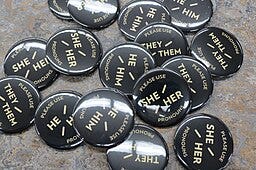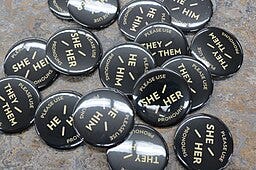Greetings Tails of Faith readers. Sorry that I have been MIA for a little bit. In addition to it being the Summer (and therefore no Narrative Lectionary), I have also received a new call to a church in South Carolina.
The congregation I have come to is one which is intentionally Open and Affirming of the Queer+ community. They were the first church in the Presbytery to ordain an openly gay Ruling Elder fifteen years ago. It, of course, took a while to get to where they are and there were many challenges along the way. I am exceedingly thankful for my predecessor, Jeff Gilstrap, and the Sessions who have nurtured this congregation into a Beloved Community that not only says that ‘all are welcome’ but actually means it.
One of the things that the congregation instituted before I got here was that on Sunday morning, every person (member, visitor, or staff) fills out a nametag. They read about this practice in an article from the Presbyterian Outlook. When I got here, I asked that they include their pronouns as well. As you might expect, some understood immediately what that meant, and others had questions. Below is the first installment of my Newsletter series educating the congregation on the use of pronouns, and why it matters. I will post part 2 tomorrow, and continue the series.
Pronoun Primmer (Part 1)
In addition to names on nametags at worship, we are asking that you also list your preferred pronoun(s).
As a refresher, pronouns are the short words (e.g. she, he, it, they, etc) that stand in for a noun or group of nouns. For people, pronouns give us the ability to refer to that person without using their name over and over again. The practice of declaring one's pronouns has become a way to show hospitality to others, recognizing that it is not always obvious which pronoun they prefer.
The majority of people are cis-gendered, meaning that their sex assigned at birth (often connected to their physiology) coincides with their gender identity (their experience of their inner being). They have no problem in using the standard pronouns ('she' for feminine persons, 'he' for masculine persons) for themselves, and outside observers can (usually) tell which pronoun to use.
For others, however, the 'standard' he/she pronouns are not appropriate. Some of these folx* may be transgender, meaning that the sex they were assigned at birth does not coincide with their gender identity. Some others may not identify as either masculine or feminine, and so identify as non-binary. Non-binary folx may use 'they/them' as alternate non-gendered pronouns, or may use another pronoun (xe/xim, ze/zim, sie/hir, etc). Still others don't want to have a pronoun used for them at all and prefer their name only. Others really don't care what pronoun you use for them. Any of these folx can experience emotional distress (called gender dysphoria) when people refer to them using the incorrect pronoun (imagine how you would feel if someone continually referred to you as 'it').
Creating an environment where the listing of one's pronouns is a common practice can help all of our siblings feel more comfortable, welcomed, and accepted for who God has created them to be. In the end, we do not have to understand someone's preferred pronouns (or understand the intricacies of their identity) to extend to them the basic love and courtesy of using the pronoun that they prefer.
*a non-gendered word referring to any and all gender expressions.




